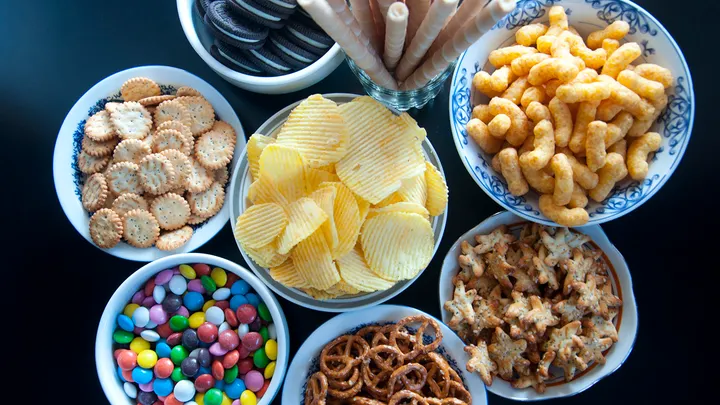Studies have shown that consuming ultra-processed foods is associated with 32 poor health outcomes. (iStock)
Ultra-processed foods have become a significant part of the American diet. On October 5, 2024, a report revealed that 60% of the average American’s daily calorie intake comes from these foods, raising concerns about public health. The study, published in the BMJ, showed that ultra-processed foods (UPFs) are linked to 32 health issues, including heart disease, cancer, and mental health disorders. Experts believe this growing reliance on ultra-processed foods is endangering lives, especially for children.
According to Ilana Muhlstein, a registered dietitian nutritionist, the situation is worse for American kids. Over 70% of their diet is made up of ultra-processed foods. Muhlstein, based in Los Angeles, explains that this high percentage puts children at a greater risk of developing various health problems, including obesity, diabetes, and even mental health issues. She emphasizes that the types of food we eat play a crucial role in how our organs and overall systems function. The absence of essential vitamins, minerals, and healthy fats in the diet, especially in younger generations, has led to a noticeable decline in health and well-being.

More than 70% of American kids’ diets consist of processed foods, said one dietitian nutritionst. (iStock)
A generation ago, meals were more balanced, with greater emphasis on whole foods like fruits, vegetables, and healthy fats. Today, kids are consuming more fats from unhealthy sources like seed oils, fried foods, and sugary products. This shift in eating habits has experts concerned that today’s children may face a shorter lifespan than their parents. The primary cause? Diet and lifestyle choices. This is a sobering prediction considering advancements in medicine and technology that should otherwise improve life expectancy.
The study highlighted the urgency of moving children toward healthier food options. While a complete shift away from ultra-processed foods may not be practical, Muhlstein suggests adopting the 80/20 rule. This approach would involve 80% of a child’s diet coming from whole foods like fruits, vegetables, lean meats, and eggs, while the remaining 20% could include some processed treats like chips or ice cream. By shifting the balance toward whole foods, kids can still enjoy snacks, but in a way that doesn’t dominate their daily intake.
Transitioning children away from processed foods doesn’t have to be overwhelming. Muhlstein offered practical tips to help parents make healthier choices. For example, she recommends using marinara sauce instead of ketchup, which has fewer ingredients and less sugar. Another idea is replacing highly processed chicken nuggets with less processed chicken strips and moving toward baked rather than fried options. Even small swaps like choosing a hamburger over a hot dog can make a significant difference, as hot dogs contain preservatives like nitrites and nitrates that are linked to cancer risks.

Substituting ketchup with marinara sauce is a simple way to transition kids away from an ultra-processed diet. (iStock)
It’s not just about food, though. Muhlstein encourages parents to make mealtime a family affair, without distractions like television or electronics. Studies show that sitting down for family meals, even just three to five times a week, can reduce the risk of eating disorders. This time together not only helps kids form healthier eating habits but also builds a positive relationship with food.
In addition to these small but impactful changes, Muhlstein stressed the importance of introducing kids to a variety of flavors and textures from an early age. Children who grow up eating a limited diet, such as chicken nuggets, sugary yogurts, and pizza, are less likely to expand their palate later in life. This can lead to lifelong struggles with poor eating habits and associated health risks.
Parents who take the time to expose their children to healthier, whole foods can help them develop a better relationship with food, leading to improved health outcomes. The goal isn’t perfection but progress. Transitioning to a healthier diet should be joyful and gradual, making it easier for both kids and parents to adjust.
Ignoring this growing issue could have long-term consequences. With the current trend of ultra-processed food consumption, it’s not just the immediate health risks like obesity and diabetes that are worrying. The mental and emotional toll of poor nutrition is becoming evident, with increasing rates of mental health issues being linked to dietary habits. Failing to act now could result in this generation facing more health challenges than ever before.
Ultimately, Muhlstein’s advice is simple: start small, be patient, and make healthy eating a family priority. With just a few adjustments, parents can help steer their children away from ultra-processed foods and toward a healthier future.
#HealthMatters #UltraProcessedFoods #HealthyKids #NutritionTips #EatSmart
